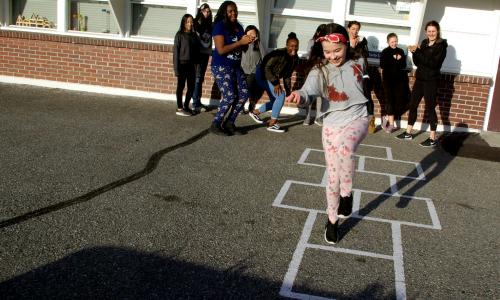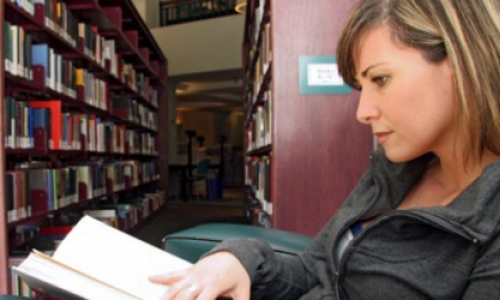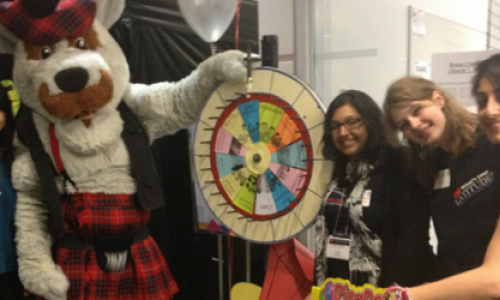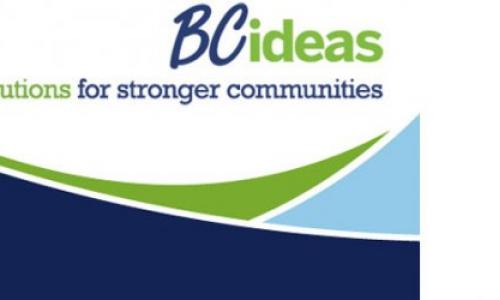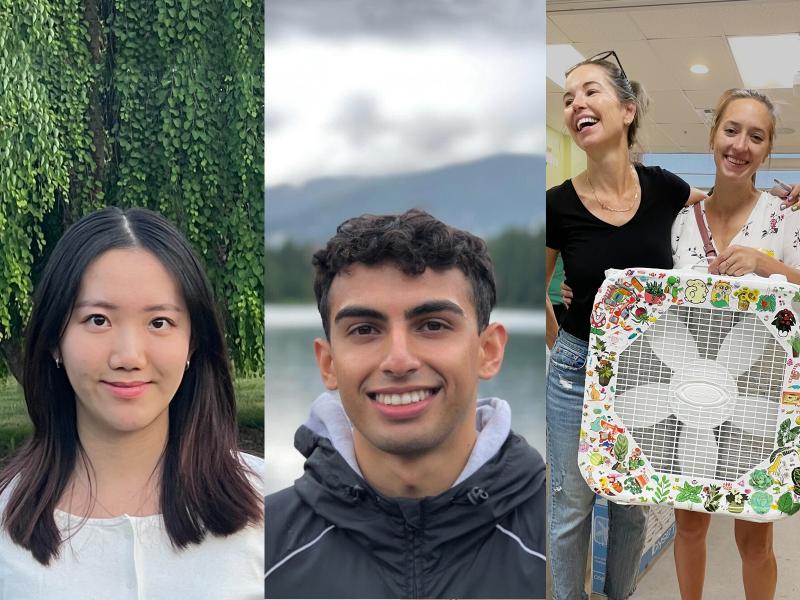
This blog post was originally published on the Faculty of Health Sciences website on October 25, 2023.
There were few people in British Columbia whose lives went untouched by the wildfires this past summer – many saw thick smoke blanketing their communities for days while others were forced to flee their communities, sometimes for weeks.
Health Sciences Co-operative Education students Prem Gundarah and Jenny Huang didn’t anticipate that the wildfires would impact their work term as research assistants with the Pacific Institute of Pathogens, Pandemics and Society (PIPPS). However, their indoor air quality project – led by PIPPS research lead and Faculty of Health Sciences (FHS) associate professor of professional practice, Anne-Marie Nicol – became a timely opportunity for community outreach to help protect equity-deserving populations from wildfire smoke.
Gundarah and Huang, along with SFU Political Science Co-op student Tatiana Parrish, were tasked with creating a DIY (Do It Yourself) guide for building air cleaners using commonly available materials. The project was informed by a research review led by Dr. Angela Eykelbosh, an environmental health scientist with the BC Centre for Disease Control (BCCDC), who found that homemade air filtration devices ("Corsi-Rosenthal Boxes") – which gained popularity during the COVID-19 lockdown – can significantly improve indoor air quality.
Nicol’s project had three objectives: the first, to create simple, easy-to-follow DIY guides in print, video, and online formats that the public could use to build air cleaners for home use. Gundarah, Huang, and Parrish wrote brief, easy-to-follow plain language instructions and worked with Megan Yung, a Co-op student from SFU’s School of Interactive Arts and Design, to design accompanying infographics. The group focused on a simple air cleaner design involving a 20” box fan, a MERV furnace filter, cardboard, and duct tape. The compact unit was small enough to fit into most homes and apartments, making them accessible to a wider range of community members.
The second objective of the research project involved organizing a series of free workshops that brought together team members, volunteers and community members to build air cleaners as a group in accessible spaces. The materials, venues, and facilitation for these events were funded at no cost so that equity-deserving participants – such as seniors, low-income persons, folks with mobility and/or accessibility challenges, persons vulnerable to poor air quality, and others – could take home their own air cleaner, along with tips on how to best use the device, immediately after the workshop. Language and cultural accommodations were also available to help those not fluent in English.
The third project objective was to translate participants’ experiences and workshop feedback into academic research to share insights about best practices. That work is currently underway.
During May 2023 – the first month of Gundarah, Huang and Parrish’s work term – wildfire smoke began drifting into the Lower Fraser Valley. It was earlier than anticipated, and it increased the urgency of the team’s work, as organizations in the region speculated that this wildfire season could be long and protracted. Although Nicol had secured funding and supports for some workshops from project partners BC Lung, the City of Vancouver, the Canada Summer Jobs program, and SFU's Community Engagement Initiative, the team began brainstorming what other groups they could approach to fund additional workshops.
Gundarah came up with the idea to seek out a community grant from VanCity Credit Union. The challenge he faced, however, was that many organizations take months to process grant requests and it was already June 2023 - well into wildfire season. Also, he’d never written a grant proposal before, nor had he ever created a project budget.
Only slightly daunted, he reached out to PIPPS’ other staff for advice, took the initiative to research these skills on YouTube, and quickly put together the necessary documentation for the grant application. “VanCity [replied] to me within a week and said they had moved up the project because it was so topical,” he said proudly. Within three weeks, the project team had secured $10,000 from the credit union and began planning more outreach events.
The PIPPS Co-op position represented many firsts for Huang: it was her first work term, and her first experience of engaging in population research. She found the experience of collaborating and working with project partners particularly special: “I got to learn more about their roles and the different career opportunities in the health and environmental sciences field.”
She adds that this role was her first time engaging in project coordination: “it was definitely exciting getting to apply my past knowledge and skills developed from my health science courses and volunteer experience. Usually, I am the one who is trained to help deliver an event, but for this project, I got to contribute my ideas to improve the workshops.”
Gundarah – who has completed Co-op work terms situated within the private sector – found this experience very different from his previous roles: “we are making such a larger impact on the communities…we're seeing the immediate impact of people having these air cleaners [and sharing]… knowledge about indoor air quality.”
Gundarah and Huang are now reflecting on what the future holds for them as they work through their degrees. “I've always been interested in community engagement and health communication,” says Gundarah, “[This experience] has made me want to work in public health for sure.” In fact, he is continuing to work with PIPPS through the fall to improve indoor air quality for equity-deserving populations in BC in preparation for the approaching respiratory illness season.
Huang’s enthusiasm for this work was similarly bolstered. “Going forward, I want to pay more attention to opportunities that allow me to work with the public. I really enjoyed the interactions and conversations… with workshop participants, so building social connections is now a personal value that I want to incorporate into my next co-op work term.”
Beyond the Blog
-
Check out previously funded projects in the SFU Student-Community Engagement Competition.








